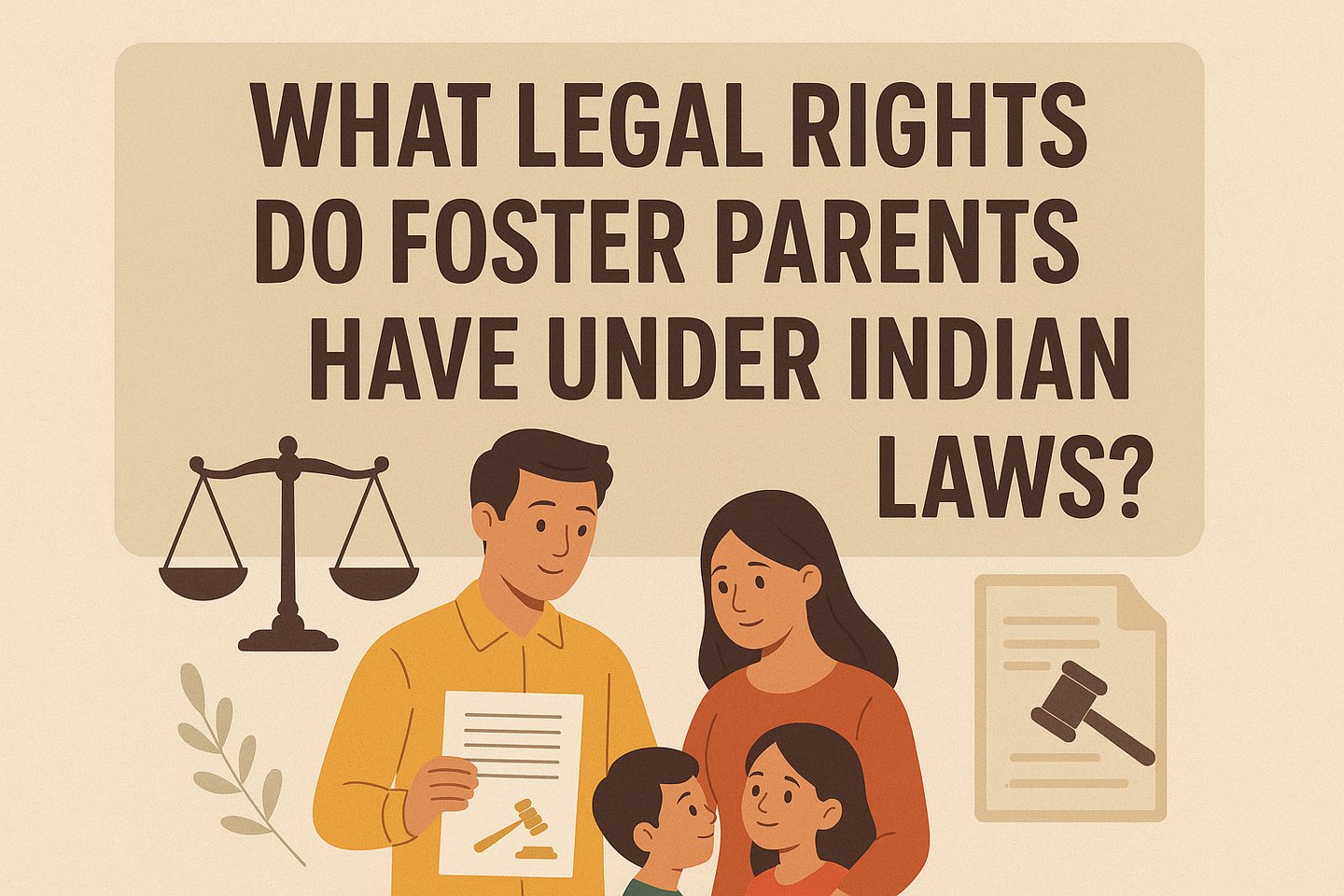What Legal Rights Do Foster Parents Have Under Indian Laws?
Foster care in India gives children a safe, temporary home when they cannot stay with their own parents. Foster parents care for the child’s daily needs and well-being, but do not get full legal or parental rights
FAMILY LAW
Dhiraj Kumar
8/14/20254 min read


In the heart of every society lies a silent question: Who cares for those who cannot care for themselves? Children are perhaps most vulnerable when they do not have a safe home and their well-being depends not just on laws but most importantly on human compassion that fills the space where parents should be. Foster parents in India fill this space providing stability, shelter and love but unlike adoptive parents their role is not permanent and at the same time their legal rights are temporary but carry significant responsibilities.
The Legal Roots of Foster Care in India
The foundation of foster care rights in India is set by the Juvenile Justice (Care and Protection of Children) Act, 2015 (“JJ Act”) and the Juvenile Justice Model Rules, 2016. These laws are not born in a vacuum; they come from a vision that children deserve a family-like environment even when their biological family cannot provide it. Foster care is described as a temporary arrangement Under Section 44 of the JJ Act, This section says that if a child cannot live with their biological parents (because of neglect, abuse, loss of parents, or other reasons), the government or the Child Welfare Committee (CWC) can arrange for the child to live with another family for care and upbringing. The law recognises foster parents as caretakers, not owners, of the child’s destiny their powers flow from the CWC’s order, not from biological or permanent parental rights.
The Scope of Foster Parents’ Legal Rights
1. Right to custodial care:- Foster parents can provide emotional care, food, clothing, as well as shelter to the child. They can also make day-to-day decisions for the child, such as medical checkups or school enrollment.
2. Rights that involve child development:- Foster parents' involvement is often involved in decisions about social development, education, and health. The law trusts them to act in the best interests of the child while being monitored.
3. Right to Support from the State:- The JJ Model Rules allow for financial aid, counselling, and training to ensure foster parents are equipped for the role.
4. Right to Be Heard:-If issues arise whether about the child’s needs or the foster home’s challenges foster parents have the right to raise them with the CWC.
The Boundaries Rights That Do Not Exist
But law, like life, sets limits. Foster parents do not enjoy certain powers because the placement is temporary and under the State’s watchful eye.
● No Automatic Guardianship:- Legal guardianship remains with the State or the child’s biological parents unless the court grants otherwise.
● No Inheritance Rights:- The child cannot claim the foster parents’ property unless a will is made in their favour.
● No Freedom to Change Identity: - Any change in name, religion, or relocation outside the district needs CWC approval.
“The Case Law: Sheela Barse v. Union of India (1986) 3 SCC 632”
Background
This was a public interest case where the Supreme Court considered the condition of children in need of care and protection. The issue was not about foster parents directly, but about the principle that children should not be kept in institutional care unless absolutely necessary.
Court’s View
The Court said that children should be placed, wherever possible, in family-like environments. It emphasised the role of foster care as a preferred option over long-term in stitutionalisation.
Why it Matters for Foster Parents
This judgment set a moral and legal tone foster care is not charity, it is part of the child’s right to grow up in a supportive environment. While the judgment did not list foster parents’ rights, it gave weight to the policy decisions in the JJ Act that grant foster parents certain caregiving powers.
Practical Challenges in Rights Enforcement
Even with clear laws, in practice, foster parents often face uncertainty. CWC reviews, periodic inspections, and bureaucratic delays can make them feel insecure about the child’s future. Some foster parents wish to adopt but face hurdles in proving eligibility under CARA’s adoption guidelines.
Additionally, financial support from the State is often inconsistent. While the JJ Model Rules provide for it, implementation varies widely across states. Here, the gap between law in books and law in action becomes evident a point philosophers and jurists alike have long debated.
The Future Strengthening Rights Without Weakening Safeguards
The legal rights of foster parents in India are not static. They evolve with child protection policies, public awareness, and judicial interpretations. Strengthening these rights might include:
● Clearer timelines for CWC reviews.
● Stronger financial and counselling support.
● Training programmes for foster parents on legal responsibilities.
● A fast-track process for foster parents who wish to adopt after long-term care.
Yet, any expansion of rights must maintain the child’s welfare as the primary goal. The philosopher would remind us: rights given to adults in child care must be seen as tools for the child’s growth, not as entitlements for the adults themselves.
Conclusion
Foster parents in India walk a noble yet delicate path. The law grants them the right to care, to guide, and to participate in a child’s life but not to claim ownership over that life. Their powers are temporary, their influence profound.
From a philosophical standpoint, this balance is not a flaw but a design: it ensures that the child’s needs come first, while allowing foster parents to act as a shelter in life’s storm.
In the Indian legal context, foster children truly come through foster parents not from them and the law ensures that this passage is safe, caring, and purposeful.
